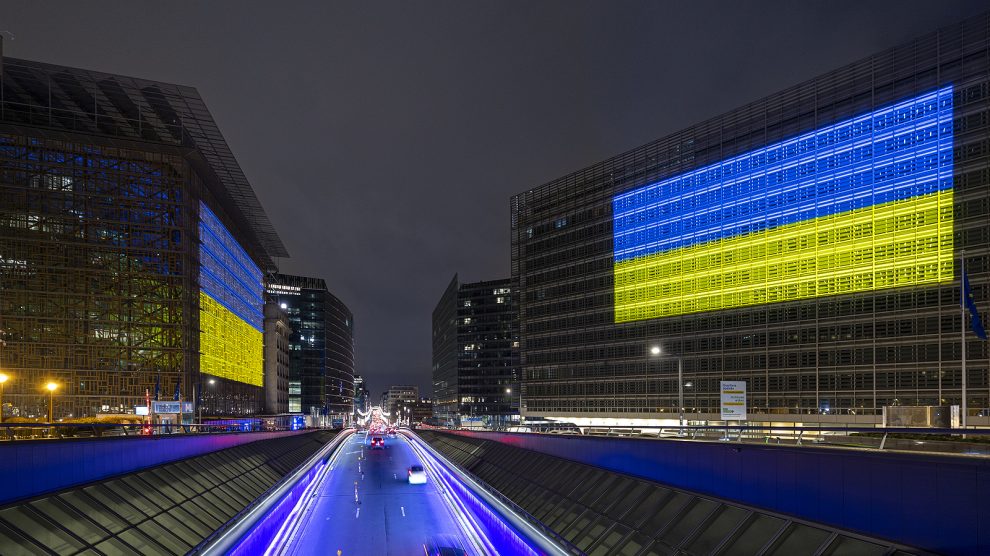The European Commission has recommended that formal EU membership negotiations should begin with Ukraine and Moldova in a move its president, Ursula von der Leyen, described as a response to “the call of history”.
Ukraine and Moldova’s bid to join the European Union received a boost on November 8 when the European Commission recommended that the two countries should begin the process of joining the bloc.
In a major enlargement package, the Commission also recommended EU candidate status for Georgia, and the opening of accession negotiations with Bosnia and Herzegovina, once the necessary degree of compliance is achieved.
- Ukraine must look to the private sector for a green and resilient reconstruction
- A failed presidential impeachment vote highlights divisions in Georgia
- Kurti and Vučić: The odd couple who made oddity a science
“Some 10 years on from the beginning of the Maidan protests, when [Ukrainians] were shot because they wrapped themselves in a European flag, we today recommend that the European Council opens accession negotiations with Ukraine and Moldova,” said Commission President Ursula von der Leyen, who hailed the progress both countries have made since they were accepted as EU candidate countries last year.
“Ukraine continues to face tremendous hardship and tragedy provoked by Russia’s war of aggression. And yet, Ukrainians are deeply reforming their country, even as they are fighting a war that is existential for them. Ukraine has completed—I was there over the weekend and was convinced of it – well over 90 per cent of the necessary steps that we set out last year,” she said.
On Moldova, von der Leyen said that while the country was not fighting a “kinetic” war, “Moldova is the subject of constant destabilisation efforts against its democracy. But like Ukraine, Moldova has undertaken significant reform efforts.”
The news was greeted with jubilation in Kyiv and Chişinău.
“This is a strong and historic step that paves the way to a stronger EU with Ukraine as its member,” President Volodymyr Zelensky said, vowing to press on with reform.
His Moldovan counterpart, Maia Sandu, said that, “Moldova is firmly on the path for EU membership and we will continue working relentlessly towards this goal.”
While both countries still have some work to do to complete the formal conditions to start talks, they could begin by the end of this year if the European Council, made up of heads of state and government, adopts the recommendations at its next meeting on December 15.
An aide to Hungarian Prime Minister Viktor Orbán said on November 8 that Budapest would not support Ukraine’s EU integration unless Kyiv changes its laws on minorities, in particular as regards education. However, it was not specified if he was referring to accession talks.
Tbilisi celebrates
The day’s largest celebrations came in the Georgian capital Tbilisi. The country missed on candidate status last year, but the Commission appears to have softened its approach given the Georgian public’s widespread support for EU membership.
“[The Commission] fully supports the genuine aspirations of the overwhelming majority of its citizens to join the European Union,” said von der Leyen, who also had a message for the Tbilisi government: “These aspirations need to be better mirrored by the authorities who should engage more with the opposition and civil society on matters of national interest.”
Georgia’s government has long been accused by civil society of dragging its feet over the necessary reforms needed to make EU membership a possibility. It has also faced criticism over its close relationship with Russia, despite Moscow occupying a fifth of the country. In its recommendation, the Commission made it clear that Georgia would need to align with the EU on sanctions for candidate status to for confirmed.
“This is a historic day for Georgia,” said Prime Minister Irakli Garibashvili, not mentioning that his ruling Georgian Dream party recently attempted to impeach President Salome Zourabichvili after she travelled to Berlin and Brussels in August and September to advance Georgia’s EU case without the prior agreement of the government.
Western Balkans
On Bosnia and Herzegovina, the Commission recognised a number of positive political and legal steps, such as the swift entry into office of a new Council of Ministers in January 2023 and the commitment of political parties to the goal of EU accession.
There has also been progress in the fight against organised crime, money laundering and terrorism, but the Commission noted with concern the various unconstitutional laws adopted by representatives of the Republika Srpska, one of two entities that make up the country.
Against this backdrop, the Commission recommended the opening of accession negotiations only once the necessary degree of compliance with membership criteria is achieved.
Elsewhere in the Western Balkans progress on EU accession reforms has largely stalled, according to the Commission, which noted that neither Serbia nor Kosovo had yet to fulfil their obligations under the EU-facilitated normalisation deal agreed last year, a key part of their European paths.
Unlike many news and information platforms, Emerging Europe is free to read, and always will be. There is no paywall here. We are independent, not affiliated with nor representing any political party or business organisation. We want the very best for emerging Europe, nothing more, nothing less. Your support will help us continue to spread the word about this amazing region.
You can contribute here. Thank you.


